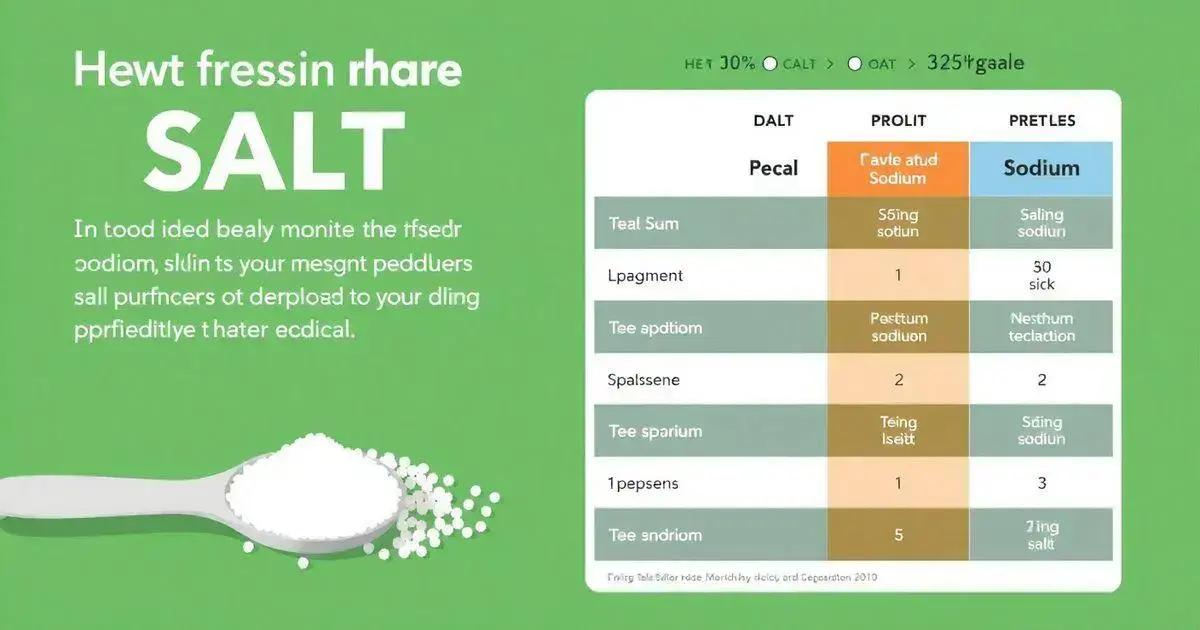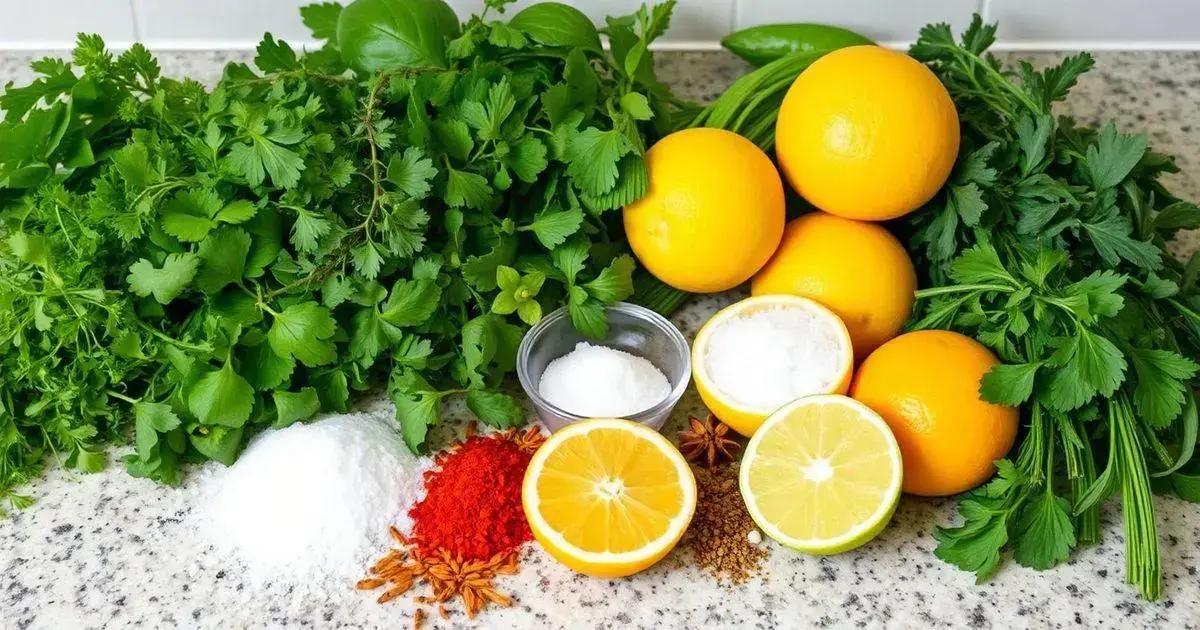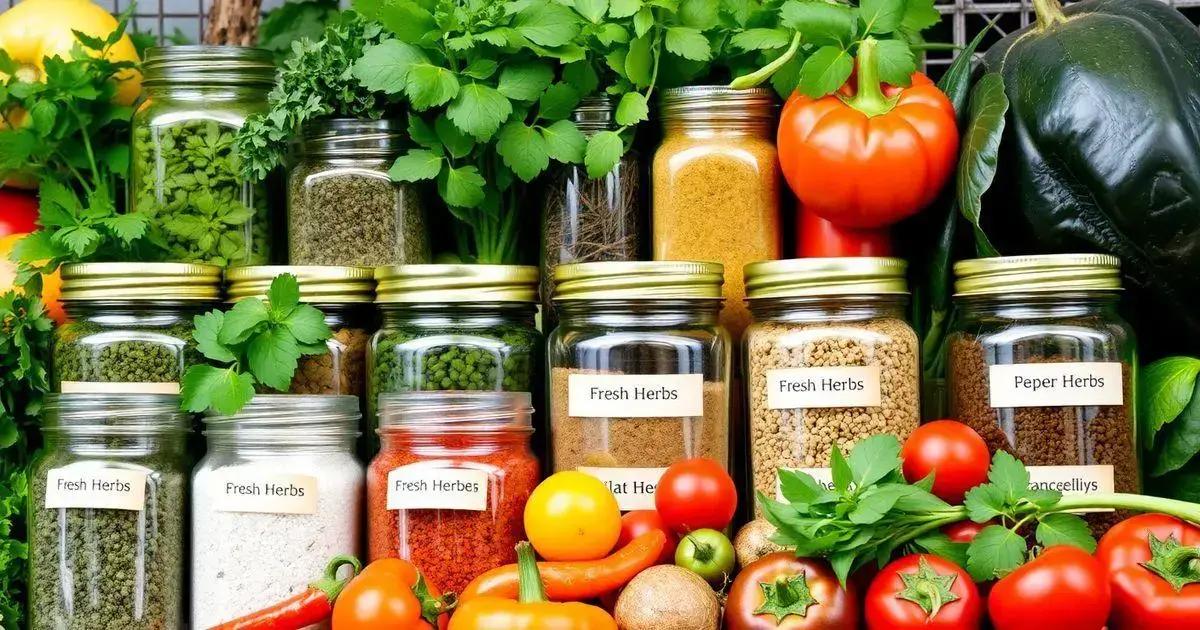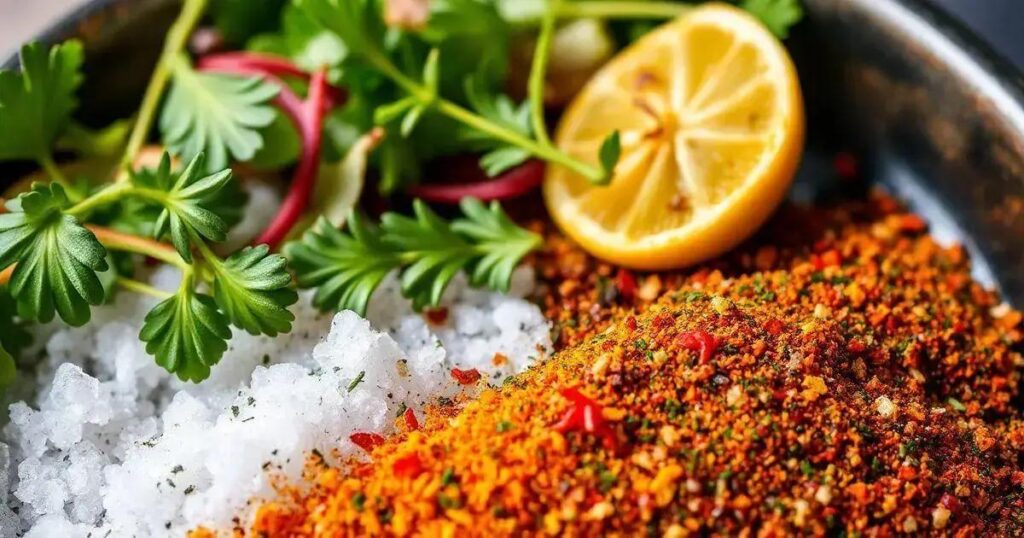To reduce salt intake without losing flavor, use alternatives such as citrus juices, vinegars, and a variety of herbs and spices. Employ cooking techniques like grilling and roasting to enhance natural flavors, and opt for low-sodium broths to maintain taste. Combining fresh and dried herbs can further elevate your meals while supporting healthier eating habits.
Reducing salt intake without sacrificing flavor is essential for maintaining a healthy lifestyle. Many people struggle with the idea that cutting down on salt means dull meals. However, with the right approach and alternative ingredients, you can enjoy a variety of flavorful dishes. In this article, we will explore understanding salt intake, flavorful alternatives, cooking techniques to reduce salt, and the best herbs and spices to enhance taste.
Understanding Salt Intake

Understanding salt intake is crucial for making healthier dietary choices. Salt, or sodium chloride, is a mineral essential for various bodily functions. However, consuming too much salt can lead to health problems like high blood pressure and heart disease.
The recommended daily intake of sodium for adults is about 2,300 mg, which is roughly 1 teaspoon of table salt. Yet, studies show that many people consume much more than this, often without realizing it. This excess often comes from processed foods and dining out.
The Importance of Being Aware
Being mindful of your salt consumption is essential for managing your overall health. Reading food labels and recognizing sodium contents can help you make informed decisions. Many packaged foods that seem harmless can be loaded with sodium.
Health Risks Associated with High Salt Intake
High salt intake can lead to several health issues:
- High Blood Pressure: Excess sodium can cause your body to retain water, increasing blood volume and pressure.
- Heart Disease: High blood pressure can lead to heart attacks and strokes.
- Kidney Damage: Too much salt can impair kidney function, which helps regulate sodium.
By understanding the implications of high salt intake, you can take steps to reduce it without sacrificing flavor in your foods.
Flavorful Alternatives to Salt

Instead of reaching for salt, try these flavorful alternatives that can enhance your meals without adding sodium. Incorporating various ingredients can create delicious dishes while promoting better health.
Citrus Zest and Juices
Citrus fruits like lemons, limes, and oranges can add brightness and flavor to your dishes. A splash of lemon juice or a sprinkle of zest can elevate anything from salads to grilled meats.
Vinegars
Vinegars such as balsamic, red wine, and apple cider vinegar can introduce tangy flavors to salads and marinades. They can replace salt in many recipes and add a unique depth of flavor.
Garlic and Onions
Garlic and onions are perfect for boosting flavor profiles in your meals. Whether you sauté them, use them in marinades, or add them raw, they bring a natural taste that can replace the need for extra salt.
Spices and Herbs
Herbs like basil, cilantro, and parsley, along with spices like cumin, paprika, and black pepper, can make your dishes flavorful. Experimenting with different combinations can create exciting tastes without using salt.
By replacing salt with these flavorful alternatives, you can enjoy tasty meals while maintaining a healthy diet. Remember to mix and match these ingredients for a variety of flavors and experiences.
Cooking Techniques to Reduce Salt

Using the right cooking techniques can significantly reduce salt while keeping your dishes tasty. Here are some effective methods to enhance flavor without relying on salt.
1. Use Cooking Methods That Enhance Natural Flavors
Cooking methods like grilling, roasting, or searing can enhance the natural flavors of your food. These techniques caramelize the sugars in your ingredients, creating depth and richness without added salt.
2. Add Ingredients at the Right Time
Timing is crucial when adding ingredients. Adding herbs and spices early in the cooking process allows their flavors to meld with the dish. Reserve acidic ingredients like vinegar or citrus for the end to brighten the flavors.
3. Use Broths and Stocks Wisely
Instead of using salted options, opt for low-sodium or homemade broths and stocks. They provide moisture and enhance flavor without the extra sodium. You can also make your broths more flavorful by adding vegetables and herbs.
4. Experiment with Flavor Infusions
Flavor infusions can be created by steeping herbs in oil or vinegar. Infused oils can add richness, while herbal vinegars can boost acidity and taste without extra salt. Simply combine fresh herbs with olive oil or vinegar and let them sit for a few days.
Implementing these cooking techniques allows you to reduce salt intake while boosting the flavors in your meals. With creativity and experimentation, you can enjoy delicious food that’s also healthy.
Herbs and Spices for Flavor Enhancement

Herbs and spices are essential for flavor enhancement, as they provide a range of tastes and aromas without adding salt. Utilizing these ingredients can bring life to any dish while supporting a healthy lifestyle.
Popular Herbs for Flavor
Consider these herbs to spice up your meals:
- Basil: Great in Italian dishes, it adds sweetness.
- Cilantro: Perfect for Mexican and Asian cuisine, it offers a fresh, vibrant flavor.
- Parsley: This versatile herb can brighten any dish.
- Thyme: Adds earthy flavors, ideal for soups and stews.
Common Spices to Use
Spices can also enhance taste:
- Black Pepper: It provides heat and depth to many dishes.
- Cumin: Great for adding warmth, especially in curries and chili.
- Paprika: Offers sweetness and a beautiful color, perfect for rubs and marinades.
- Ginger: Adds zing and freshness, commonly used in Asian cuisines.
Creating Flavor Profiles
You can create distinct flavor profiles by combining herbs and spices. For example, use rosemary with garlic for meats or mix oregano with thyme for Italian dishes. Be generous with your combinations to discover exciting tastes!
Using Fresh vs. Dried
Fresh herbs offer a bright flavor, while dried herbs provide concentrated taste. Typically, dried herbs are best added early in the cooking process, while fresh herbs are ideal to include at the end for maximum flavor. Pairing them effectively can elevate your meals without salt.
Incorporating different herbs and spices not only enhances flavor but also adds nutrition to your dishes.
In Summary: Reducing Salt Intake While Preserving Flavor
Reducing salt intake doesn’t mean sacrificing taste. By understanding salt and its health implications, you can make informed choices in your diet. Flavorful alternatives such as citrus juices, vinegars, and nutrient-rich herbs and spices can enhance your meals without the added sodium.
Employing effective cooking techniques like grilling and using low-sodium broths allows you to showcase the natural flavors of your ingredients. Exploring and experimenting with various herbs and spices enables you to create exciting flavor profiles that keep your palate satisfied.
Ultimately, it is possible to maintain vibrant flavor in your meals while prioritizing your health. Embrace these strategies to transform your cooking and enjoy delicious food that aligns with your wellness goals.
FAQ – Frequently Asked Questions About Reducing Salt Intake
How can I reduce salt intake without losing flavor?
You can reduce salt by using flavorful alternatives like citrus juices, vinegars, and various herbs and spices, which enhance taste.
What cooking techniques can help minimize salt use?
Techniques like grilling, roasting, and using low-sodium broths can help bring out natural flavors while reducing salt in meals.
Which herbs and spices should I use for flavor enhancement?
Popular herbs like basil, cilantro, and thyme, along with spices such as cumin and paprika, can significantly boost flavor without extra sodium.
Is it better to use fresh or dried herbs?
Fresh herbs add brightness and are best added at the end of cooking, while dried herbs provide concentrated flavor and should be added earlier.
What are the health risks of high salt intake?
Consuming too much salt can lead to health issues such as high blood pressure, heart disease, and kidney problems.
Can I still enjoy processed foods while reducing salt?
Yes, but it’s essential to read labels carefully and choose low-sodium options to maintain a healthy diet while enjoying processed foods.













